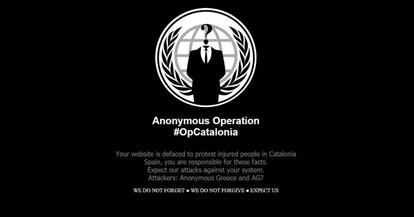Spain working to prevent cyberattacks and fake news during Catalan election
Manual vote count cannot be tampered with, but website with preliminary results could be vulnerable

The outcome of the December 21 election in Catalonia cannot be manipulated, because the Spanish electoral system is based on a manual ballot count carried out in front of election officials and party representatives. In the event of a complaint, there can be a recount.
But it¡¯s another story when it comes to the preliminary results announced on election night. Any interference with these figures would not change the official outcome, but it would create confusion and damage the public trust in the democratic system.
Cyberactivists with Anonymous have reactivated their pro-independence campaign
The Spanish government has drafted a plan to prevent such a situation.
The goal of disinformation campaigns ¡°is not to secure a specific outcome [at elections], but to undermine trust in the same,¡± warned Janis Sarts, director of NATO¡¯s Strategic Communications Center, on Thursday.
Despite the fact that the Spanish voting system has safeguards against fraud, emotions are running high and social media platforms are awash with messages posted by pro-secession users suggesting the possibility of vote-rigging on December 21.
The pro-independence association ANP and the far-left CUP party have even announced a parallel recount of their own using an app.
Government sources have admitted that the Socialist Party (PSOE) and Ciudadanos, their main allies in the activation of Article 155 of the Constitution, have urged them to develop a plan to counter the smear campaigns against Spanish democracy.

The government has set up a working group to guarantee that nothing will alter the normal operation of election procedures. Members include representatives from the Interior Ministry, the Public Administration Secretary of State¡¯s Office, the National Cryptologic Center (CCN) and the Office of the Secretary of State for Communications, in partnership with the Center for Communications and Information Technology (CCTI) and the Center for Information Security of Catalonia (Cesicat), both of which answer to the Catalan government.
Their tasks include supervising the work of Indra, the company that is in charge of the preliminary vote count.
The biggest concern involves the period of time from 8pm, when the polling stations close, until the official count is over and the outcome is announced, three to six days after election day.
The Socialist Party and Ciudadanos have urged the government to develop a plan to counter smear campaigns against Spanish democracy
The working team has assessed the risks, which would chiefly take the form of cyberattacks: one possibility is a Denial of Service (DoS) attack against the website that will publish the provisional results, and another that this website could be replicated to show fake results.
Both scenarios would create considerable concern in a country accustomed to having reliable data just a few hours after polling stations close.
Cyberactivists with the Anonymous group have reactivated their pro-independence campaign, and boast about having infiltrated Indra¡¯s network for 20 days in order to show its vulnerability. The company admits the attack took place, but denies that client information has been compromised, or that the count on December 21 could be affected.
Then there is the issue of how to combat fake news, a task that will fall to the Office of the Secretary of State for Communications. The government has consulted with countries that have dealt with this type of interference during their own elections. Spain lacks specific legislation on the matter, and many of these attacks originate abroad, which makes it harder to go after the perpetrators.
Still, NATO expert Janis Sarts notes that ¡°a government¡¯s lack of credibility¡± is its greatest vulnerability.
English version by Susana Urra.
Tu suscripci¨®n se est¨¢ usando en otro dispositivo
?Quieres a?adir otro usuario a tu suscripci¨®n?
Si contin¨²as leyendo en este dispositivo, no se podr¨¢ leer en el otro.
FlechaTu suscripci¨®n se est¨¢ usando en otro dispositivo y solo puedes acceder a EL PA?S desde un dispositivo a la vez.
Si quieres compartir tu cuenta, cambia tu suscripci¨®n a la modalidad Premium, as¨ª podr¨¢s a?adir otro usuario. Cada uno acceder¨¢ con su propia cuenta de email, lo que os permitir¨¢ personalizar vuestra experiencia en EL PA?S.
?Tienes una suscripci¨®n de empresa? Accede aqu¨ª para contratar m¨¢s cuentas.
En el caso de no saber qui¨¦n est¨¢ usando tu cuenta, te recomendamos cambiar tu contrase?a aqu¨ª.
Si decides continuar compartiendo tu cuenta, este mensaje se mostrar¨¢ en tu dispositivo y en el de la otra persona que est¨¢ usando tu cuenta de forma indefinida, afectando a tu experiencia de lectura. Puedes consultar aqu¨ª los t¨¦rminos y condiciones de la suscripci¨®n digital.










































